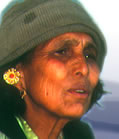THEMES IN THIS
TESTIMONY
Development

Education

Gender

Click on arrows
to find more
testimonies
featuring
these themes
|
|
Sex
|
female
|
|
|
Age
|
35
|
|
|
Identity
|
N
|
|
|
Occupation
|
teacher/shop owner
|
|
|
Location
|
Siddheswor VDC, Sindhuli
|
|
|
Date
|
August 1994
|
|
summary
An all-too-short interview, but illuminating about the many areas of discrimination women face. From birth onwards, gender discrimination is evident - "If a boy is born, everybody is happy and they celebrate, but when a girl is born the parents become sad and worried. ... They think that girls are really others' property and it's of no use to educate them.” Religion dictates that women should "treat the men as gods and be their slaves". The narrator says that men have been dictating society for a very long time, and that men “made the rules according to their need … they have been keeping women at the back”. Women are paid much less for equal work, and “most of the work is done by the women, but the credit goes to the men”. She believes equality is vital for the nation's development: "You cannot clap with only one hand or the cart cannot move on one wheel; both the men and the women should be equal in all aspects to develop a nation.”
detailed breakdown
|
You will need a password from Panos to view the full
transcript of the interview. To apply for a password, click here.
Once you have a password, click here to go to the beginning
of the transcript. You can also click on any section of the
breakdown of content below and go straight to the
corresponding part of the transcript.
|
| Section Section 1-2 |
Has taught for 14 years and had a shop for five years. Lives with her parents.
She believes gender discrimination starts at birth. Parents hold daughters back, she explains, “The parents are always worried that, if they send their daughter out the others will not think good of them, so it will be difficult for them to get married in the future.”
Unfair inheritance and property rights: “I think this kind of discrimination must not be there, the daughter must have equal rights to her parent's wealth and properties as the son does.”
Law does not stipulate that fathers must look after daughters, though they are bound to look after sons.
|
| Section Section 2-3 |
Affect of such discrimination on development: “When there is discrimination between the son and the daughter in the house, how can such a house be good and have the environment for development? With such families how can the village develop or the district and the nation?”
|
| Section 3 |
Women also need to be "encouraged to be smart, outgoing and forward”. Describes how villagers gossiped when she went to school, saying women would be spoiled by education. "I was really worried but I took it as a challenge.” When she returned as trained teacher, villagers changed their views and began sending daughters to school: “Now, even in this illiterate society the people think the daughter must be educated, at least they are more aware now. This is the biggest change I find these days.”
Women nowadays have more mobility and therefore can go out to work.
|
| Section 4 |
Other improvements she cites are equal wages (though this is disputed by the interviewer), more women in offices, and girls allowed to study or teach in faraway places.
The interview ends with her thoughts about the future: “So, if the girls are educated, have equal rights in the society as well as in the law, the development of our nation will automatically be enhanced.”
|
|


